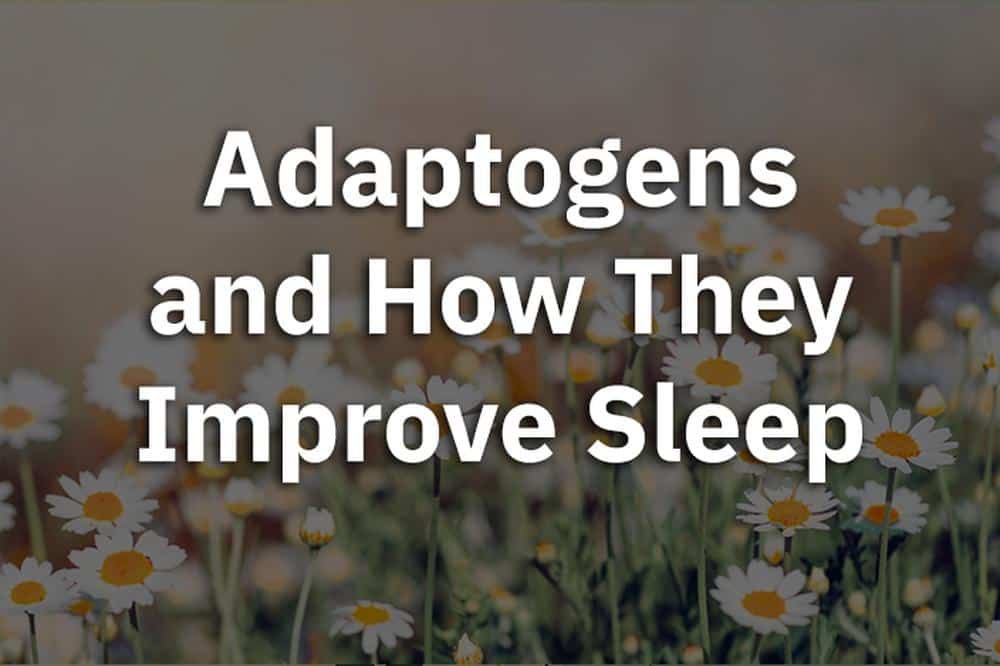We understand that people often seek supplements and medications to enhance their sleep quality, but it is important to be aware that not all options are equally effective. Also, certain drugs and supplements may have major negative effects that should be carefully examined.
If you're curious about adaptogens and how they can effect your capacity to sleep, you've come to the right place. Today, we'll talk about a few common adaptogens and how they affect sleep.
What are Adaptogens?
Adaptogens are herbs and mushrooms that have long been used in Ayurveda and Chinese medicine to enhance general well-being and assist the body in dealing with stress.
Among the most well-known adaptogens are ashwagandha, ginseng, reishi mushroom, passionflower, chamomile, and valerian root.
Adaptogens have various advantages that distinguish them from other drugs. Adaptogens, unlike many medicines, are not addictive, do not cause tolerance, and cannot be misused. Moreover, they have no negative impact on mental function.
Adaptogens are considered safe when taken in prescribed amounts and may help your body handle stress and return to a state of balance, also known as homeostasis.

How Do They Work?
Adaptogens help guard against stress by modulating homeostasis through various mechanisms. These mechanisms, which are connected to the hypothalamic-pituitary-adrenal axis, help to regulate the body's stress response.
While they work on multiple pathways, they share common molecular targets, signaling pathways, and networks in adaptogens. They are linked to stress hormones and play an important function in maintaining bodily homeostasis.
As a result, adaptogens may benefit chronic inflammation, atherosclerosis, cognitive decline, metabolic disorders, cancer, and other age-related diseases.
Adaptogens Improve Sleep by Decreasing Stress and Anxiety
Anxiety and stress may have a negative influence on your sleep quality. For example, elevated cortisol levels in the evening, when they should be at their lowest, might make falling asleep difficult.
Cortisol has a natural 24-hour cycle that aids with sleep regulation. When this cycle is disturbed, it might have a detrimental impact on your sleep-wake cycle.
Adaptogens function inside your cells to regulate your adrenal response and minimize stress. This may lead to an improvement in your sleep quality.
Common Adaptogens to Consider for Sleep
Let’s review a couple of the common adaptogens.
Reishi
Reishi is a highly revered functional mushroom in Eastern cultures, dating back thousands of years. It was even referred to as the "Elixir of Life" and the "Mushroom of Immortality" in ancient Chinese medical literature.
Reishi provides several health advantages, including stress and anxiety relief, mood enhancement, and immune system support. It also has a soothing impact on the neurological system, making it a good option for relaxing before going to bed.
Regular reishi usage may help balance your sleep-wake cycle, resulting in higher sleep quality. For optimal results, it's important to take reishi mushroom for sleep on a consistent basis.

Chamomile
Chamomile is a plant with a long history of therapeutic usage that dates back centuries. It is a member of the daisy family and it features a bright gold cone surrounded by white petals.
Chamomile has a relaxing impact on the nerves and may help ease anxiety symptoms. Chamomile tea has traditionally been used before night to help better sleep. But did you know it may also help with stomach issues caused by nervous irritability?
If you have anxiety-related digestive troubles and sleeplessness, chamomile may be a wonderful remedy to quiet your mind and ease your stomach.

Ashwagandha
Ashwagandha, also known as "Indian Winter Cherry" or "Indian Ginseng," is an evergreen plant native to India, Africa, and the Middle East.
"Ashwagandha has long been used in Ayurvedic medicine to increase energy, improve overall health and reduce inflammation, pain and anxiety”
Dr. Lin.
Ashwagandha is well-known for its ability to soothe the nervous system and promote deep, restful sleep.
Passionflower
Passionflower is a climbing shrub that contains flowers and leaves with sedative and soothing properties.
It works as a nerve tonic and muscle relaxant, making it an excellent choice for those who are restless and wake up throughout the night. Passionflower is a fantastic alternative for stress relief because of its soothing and relaxing properties.

Ginseng
Ginseng is a well-known herb that has been used for centuries for various health benefits. It is known as "man-root" because the plant's root resembles a human body.
It has traditionally been used to bolster the immune system; it is also thought to help manage blood sugar levels and improve mental concentration.

Valerian Root
Valerian is an adaptogen plant with roots and rhizomes that is used to treat insomnia, anxiety, and nervous restlessness.
It has been used in Europe, Asia, and North America from the second century A.D.
Although experts are unsure how valerian works, they think it boosts the quantity of a neurotransmitter in the brain known as gamma aminobutyric acid (GABA). GABA aids in the regulation of nerve cells and has a soothing impact on anxiety.
Adaptogen Supplements
If you're having trouble sleeping, we strongly suggest trying adaptogens. They are non-addictive and may help to relax both the mind and the body, resulting in better sleep.
When taking adaptogens, we suggest combining several types to take advantage of their synergistic effects. It's also important to take them consistently for at least 30-60 days to see the full benefits. Taking them for just a night or two won't give them enough time to work.
As a shameless plug, our Deep Sleep Reishi supplement has three adaptogens (reishi mushroom, chamomile, and passionflower) and is developed with the optimal melatonin dose to enhance sleep quality.

